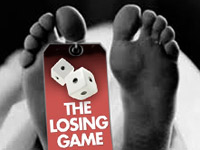 We appear on the verge of an extraordinary betrayal of the Bahamian people, made even more heart-wrenching because it is at the hands of our very own, not those of slave masters and colonial rulers.
We appear on the verge of an extraordinary betrayal of the Bahamian people, made even more heart-wrenching because it is at the hands of our very own, not those of slave masters and colonial rulers.
It is a betrayal of various core principles of the Second Emancipation of majority rule, of a certain promise of independence, and a betrayal of the poor and the middle class.
Instead of a national or public lottery benefitting significantly more Bahamians, the incumbent government seems hell-bent on regularizing/legalizing a privately-owned lottery system in which the majority of the profits accrue to already wealthy numbers barons, with the government receiving some funds from taxing the private lottery.
Regularizing a private lottery will be one of the greatest legalized mass transfers of wealth from the poor and middle class to the wealthy in an independent Bahamas.
Imagine if the Old Guard had concocted a scheme pre-1967 to establish a private lottery in which the overwhelming bulk of the proceeds went to certain benefactors and fat cats at the expense of poorer and middle class Bahamians.
One can imagine the progressives in the PLP of that day pressing hard for a national lottery in order to benefit the mass of Bahamians.
Sadly, the New Guard in the PLP are now acting like the Old Guard. The poor and middle class are secondary at best. Clearly the PLP oligarchy is more committed to serving their own greedy economic interests at the expense of the Bahamian people.
If the PLP proceeds with its private lottery scheme, history will record that this betrayal of the common good by private greed was led by Perry Gladstone Christie and the New Guard oligarchs.
The betrayal is breathtaking given our history and the great needs of our still developing country 40 years after independence. We will have come full circle with the PLP becoming the face of the very thing it fought against in the struggle for majority rule. The very party which preached social justice seems set to turn its back on the poor, handing wealthy numbers barons millions more.
A private lottery is good old right wing economics which might find favour in the US Republican Party, not something one might expect of a party which bills itself as progressive and liberal.
To understand the moment is to appreciate our Bahamian journey and narrative as well as to be seized by the possibilities of a national lottery for national development.
Enduring slavery and colonial rule the mass of Bahamians enjoyed scant political and economic freedom. Still, the descendants of slaves struggled for both, creating civic, economic, religious and eventually political organizations as a means of empowerment and expression.
The struggle for economic survival and advancement was hard and fraught for the majority of black Bahamians. With little access to financial capital they leveraged the capital they possessed such as ingenuity, hard work and communal ties.
Early on, this involved institutions like the asue or sou-sou, an informal savings arrangement derived from an African-based system of cooperation.
The story of the flowering of black entrepreneurship, especially Over-the-Hill, is still to be written in greater detail. These stories of risk-taking and ingenuity contradict the lie by some that black Bahamians were not possessed of various entrepreneurial gifts.
Since majority rule and independence there has been a flourishing of the middle class, especially of black Bahamians. In 40 years of independence the country has made great strides in terms of economic empowerment for scores of Bahamians.
Still, there remains much to be done to empower more Bahamians economically including greater access to capital for entrepreneurs to help stimulate domestic and home-grown investment. A national lottery would be a source of significant capital to help stimulate domestic development.
Today, many in the middle class are struggling with the proverbial Bahamian Dream especially after the Great Recession of 2008 and the resulting new normal of an economic landscape marked by slower growth and significant challenges in the tourism sector.
EMPOWERMENT
Amidst these economic challenges the wealth derived from the numbers business in the form of a national lottery can be utilized to broaden economic development and empowerment.
Unlike other economic enterprises, those who run the numbers houses produce nothing of economic value in terms of the numbers business itself.
Instead of allowing these barons to hoard our money for themselves, we should have our money collected into a public lottery with the bulk of the proceeds being returned to the Bahamian people.
Money pours out of poorer neighborhoods and many Family Island communities into the bank accounts of a relative few, with next to nothing returning to these communities, often leaving them even more impoverished.
These communities do not need Christmas parties and giveaways. They need concentrated economic and social investments partly derived from a national lottery in which money is reinvested in these communities.
The idea of allowing Bahamians a few shares in the numbers business was meant to sweeten the pot and drum up support for the Yes Vote in the gaming referendum/opinion poll.
Instead of a few shares, a few tokens to the masses, the Bahamian people should be the majority shareholders and owners of a legalized lottery system, a sort of modern asue that can be used to advance national development, more of which next week.
In days of old, slave masters, colonialists and the Old Guard hoarded wealth and rigged the economy to benefit their private interests at the expense of the public good.
How shameful that a New Guard which came into being to fight such entrenched greed at the expense of the mass of Bahamians now seems set to turn its back on the majority of Bahamians in thrall to a wealthy minority interest, making a mockery of much of the struggle for majority rule.
Bahamians do not need scraps from the numbers banquet table. The table and the full meal belong to the people, not to a selfish oligarchy and its benefactors.
By: Simon


